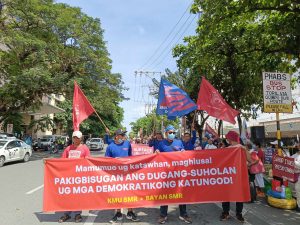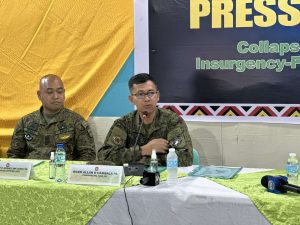The University of Mindanao (UM) is implementing a complete online suite that will replace the traditional classroom setting for its classes starting this school year, a step that will help curb the spread of the coronavirus disease 2019 (Covid-19).
The university is implementing the Blackboard Learning Management System (Blackboard LMS), a digital proprietary teaching platform that will serve as the primary teaching tool for classes, Dr. Ronnie V. Amorado, UM vice president for academic affairs, told TIMES.
The platform, which is part of the blended mode that the university is implementing, sets up a virtual classroom that whatever one finds and does in the traditional classroom “can also be done in this method,” said Amorado.
The university piloted the system two years ago for its Graduate School and, Amorado said, based on the experiment, it is advantageous both to the students, the teachers and even officials of the schools as they can readily get into this online classroom at the comfort of their homes.
Unlike other schools which use several online tools, the Blackboard LMS addresses every facet of the traditional classroom as students can listen to teachers, interact with them and their fellow students, and even simultaneously take quizzes.
During the pilot process, the online system was just a “supplemental system” to the physical classroom, but because of the pandemic, it will become the “primary system,” Amorado added.
Based on its record, last year, the university, which first opened to the public in 1946 as Mindanao Colleges, had about 30,000 students in its main campus in Matina and its campuses
Manuel Guianga, Tibungco, Tagum City, Panabo City and Penaplata in Davao del Norte, Digos City and Bansalan in Davao del Sur and its technical schools.
Amorado also allayed fears that this new system will cost the students more, pointing out that the university has bought the software and that whatever small amount that they will incur is already in their miscellaneous fees.
Just like in a traditional classroom, students will also be compelled to attend the virtual classes at a given period as their attendance will be checked, while there are also activities that they can do even if they are offline but will also be covered by deadlines.
Primarily, the system addresses the possibility of overcrowding the traditional classrooms as students will not be made to go to school, except during a two-day final examination process as “final examinations cannot be done at home due to several (obvious) factors,” Amorado said as the university is looking for ways to address the physical distancing issue during the classroom setting.
The Commission on Higher Education (Ched) has pushed for the flexible learning system, a system that combines the traditional classroom system as well as the online system, amid the coronavirus disease 2019 (Covid-19).
“The implementation of the system is timely (due to the pandemic),” said Amorado, referring to the quarantine protocols that needed to be implemented like physical distancing and the banning of congregation of students in the classroom.
Ched Chair Prospero J. de Vera III earlier expressed fear that students will face a huge challenge in the implementation of the online classes because of poor connectivity in some areas.
Amorado said the university understands that connectivity is a big challenge to students and teachers alike. To address this concern, the university is also developing a mobile application for the online classrooms that will allow students to work on some activities even offline and sync their outputs when they return online.
“At least we can mitigate (the connectivity challenge), he added.
The Department of Information and Communications Technology earlier vowed to find ways to address the issue of connectivity as it has been meeting with telecommunications companies for the latter to enhance their facilities.




